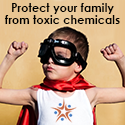
Due to modern technology it’s amazing that the grease from our pizza doesn’t stain the passenger seat when we bring it home… but have you ever paused to think of what chemicals are used to treat the pizza box to make it grease resistant? New research on perfluorinated compounds (PFOA and PFOS), sheds light on women’s increased risk of osteoarthritis from exposure to these toxic chemicals.
What did the study find?
The new study, published in Environmental Health Perspectives, is adding to the growing body of evidence that certain groups of people may be more susceptible to the health effects of toxic chemicals than others. Researchers from Yale University, Brigham and Women’s Hospital, and Harvard Medical School found that common levels of exposure to PFOA and PFOS are associated osteoarthritis. The relationship was particularly strong in women, who are disproportionately affected by osteoarthritis.
Women who were in the highest 25% of exposure to PFOA, had about twice the odds of having osteoarthritis compared to women in the lowest exposure group. (Even after the researchers took age, income, and other factors into account.)
So what does this all mean? Currently, the causes of osteoarthritis are still not well understood. The biological mechanisms by which PFOA and PFOS may cause the disease are still not definitively known, but other studies suggest these chemicals have the potential to alter the delicate balance of our natural hormones involved with inflammation, cartilage repair, and other factors related to osteoarthritis.
Women at an increased risk
When we think about groups of people who are particularly susceptible to environmental threats to our health, children and pregnant women come to mind. But when it comes to hormone-disrupting chemicals we should be thinking about how it affects men and women differently as well.
Chemicals can impact males and females differently, depending on how they interfere with our delicate hormone systems. One of the properties that make these chemicals so useful in products is the same reason we should be concerned: they break down incredibly slowly in the environment, and our bodies have a really hard time getting rid of them.
What are PFOA and PFOS and how are we exposed?
This class of chemicals has been linked to a host of health problems (in addition to the new findings in this study). For instance, PFOA is a likely human carcinogen, PFOS causes liver and thyroid cancer in rats, and both chemicals have been linked to liver and kidney damage, and reproductive problems.
PFCs have been released in large quantities from manufacturing facilities for decades, and thus contaminate our food and some water supplies. PFOS and PFOA are breakdown products of a number of PFCs.
Exposure also occurs from consumer products, house dust, and food packaging.
- Grease-resistant food packaging and paper products, such as microwave popcorn bags and pizza boxes, contain PFCs.
- PFOS was used until 2002 in the manufacture of 3M’s Scotchgard® treatment, used on carpet, furniture, and clothing.
- PFOA is used to make DuPont’s Teflon™ product, famous for its use in non-stick cookware.
- PFCs are in cleaning and personal-care products like shampoo, dental floss, and denture cleaners.
What can you do?
Clearly, our federal laws on toxic chemicals are broken. Chemicals are popping up everywhere — the single most important thing you can do is email your Senator. Congress is considering legislation right now, and they need to hear from you!
Until we have stronger laws on toxic chemicals, here are 5 tips to help reduce your exposure:
- Avoid purchasing or, at a minimum, limit use of products containing PFCs.
- Watch for packaged foods. Stay away from greasy or oily packaged and fast foods, as the packages often contain grease-repellent coatings. Examples include microwave popcorn bags, french fry boxes, and pizza boxes.
- Avoid stain-resistance treatments. Choose furniture and carpets that aren’t marketed as “stain-resistant,” and don’t apply finishing treatments such as Stainmaster® to these or other items. Where possible, choose alternatives to clothing that has been treated for water or stain resistance, such as outerwear and sportswear. Other products that may be treated include shoes, luggage, and camping and sporting equipment.
- Check your personal-care products. Avoid personal-care products made with Teflon™ or containing ingredients that include the words ”fluoro” or ”perfluoro.” PFCs can be found in dental floss and a variety of cosmetics, including nail polish, facial moisturizers, and eye make-up.
- Avoid Teflon™ or non-stick cookware. If you choose to continue using non-stick cookware, be very careful not to let it heat to above 450ºF. Do not leave non-stick cookware unattended on the stove, or use non-stick cookware in hot ovens or grills. Discard products if non-stick coatings show signs of deterioration.
Join our email list for tips and action alerts. Together, we’ll move the marketplace towards safer chemicals.




